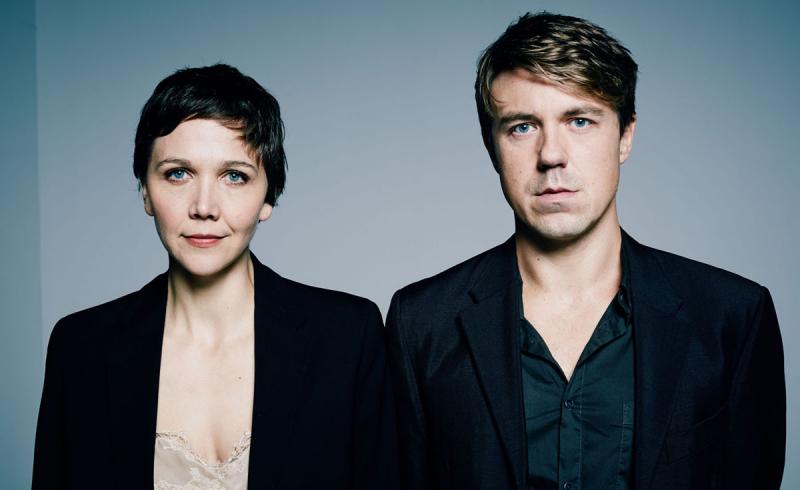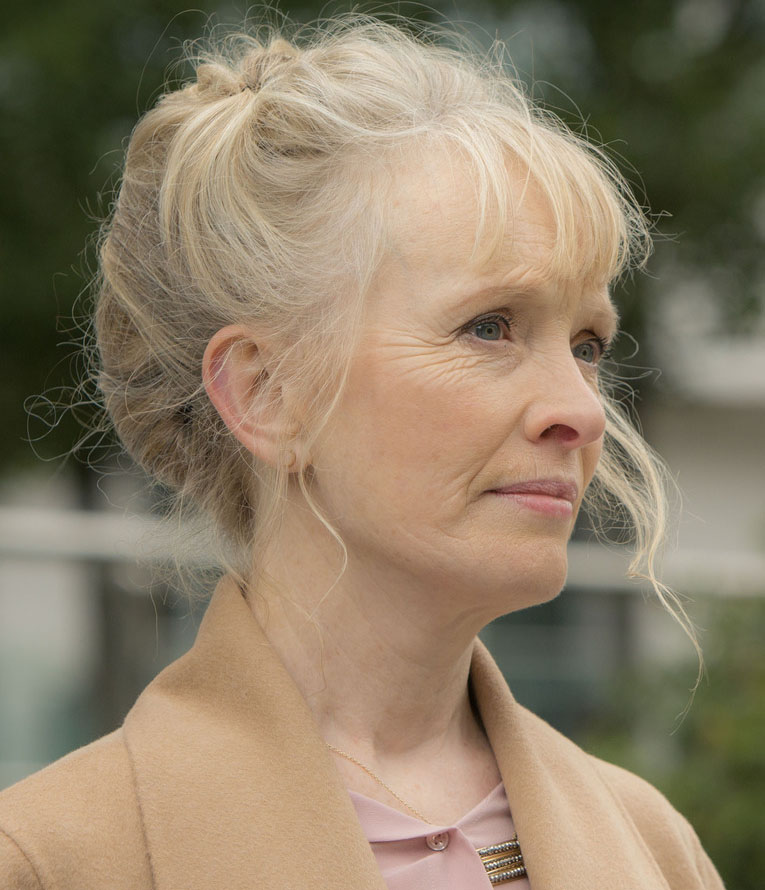The Honourable Woman, BBC Two | reviews, news & interviews
The Honourable Woman, BBC Two
The Honourable Woman, BBC Two
In which Hugo Blick tackles the personal and political complexities of the Israeli-Palestinian question

Janet McTeer has admitted that she had to read Hugo Blick's screenplay for The Honourable Woman three times before she could understand what was going on. Therefore anybody hoping to drop into this as a casual viewer can expect to find the learning curve slippery and featuring a pronounced adverse camber.
McTeer wasn't in this first episode, but there were still plenty of stellar names to be going on with. Stephen Rea (pictured below right) plays the world-weary Sir Hugh Hayden-Hoyle, the outgoing head of MI6 and a man reduced to microwaving himself solitary suppers in his apartment by the Thames. A none-too-defrosted Lindsay Duncan plays his estranged wife Anjelica, though it's odd that their relationship should trigger echoes of George Smiley and his wife Ann, since Rea played a Smiley-esque character in Blick's 2011 series The Shadow Line too. Then there was Eve Best as Monica Chatwin, back from the States to take up a new Foreign Office post in London.
 But front and centre is Maggie Gyllenhaal, making her first move into TV drama as Nessa Stein, the Anglicised daughter of a wealthy Jewish arms manufacturer who used to supply weapons to Israel. Her father's traumatic murder in the show's opening moments gave us a bracing heads-up about the stakes being played for. Three decades later, Nessa runs the Stein Group of companies, but has steered the family business towards more philanthropic ends, such as her new initiative to install fibre-optic cabling throughout the Palestinian West Bank. She believes in solving problems through education and progress rather than perpetual warfare, views shared by her mild-mannered brother Ephra (Andrew Buchan).
But front and centre is Maggie Gyllenhaal, making her first move into TV drama as Nessa Stein, the Anglicised daughter of a wealthy Jewish arms manufacturer who used to supply weapons to Israel. Her father's traumatic murder in the show's opening moments gave us a bracing heads-up about the stakes being played for. Three decades later, Nessa runs the Stein Group of companies, but has steered the family business towards more philanthropic ends, such as her new initiative to install fibre-optic cabling throughout the Palestinian West Bank. She believes in solving problems through education and progress rather than perpetual warfare, views shared by her mild-mannered brother Ephra (Andrew Buchan).
It looks like the eight-part series is going to plot a complicated course through the bitter and intractable politics of the Middle East and how they've been entwined with Britain's history, though there's no telling how credible all this might be. Already there has been a resurgence of that Blickian tendency to set up portentous dialogues between characters representing important interests of state, all delivered with an air of immense gravity while carefully keeping the viewer starved of information. They are the insiders, he seems to be saying, and you little people will just have to wait your turn (Lindsay Duncan, below).
 Blick certainly seems to like the idea of stripping away pompous, formal facades to reveal the rottenness or betrayals beneath. Nessa herself has just been made Baroness Stein of Tilbury (handy training for Gyllenhaal if she ever gets her wish to appear in Downton Abbey, where her flawless English accent could put some home-grown actors to shame), and this prompted a lot of traipsing down ancestral passageways dressed in ermine. So far it doesn't seem to be telling us anything new about the secretive workings of the Establishment, though. For that matter, how feasible is it that the head of MI6 gets his information about whether a Palestinian multi-millionaire was murdered or committed suicide by playing chess with an elderly Jewish gentleman called Judah, who somehow knows all the innermost secrets of Mossad and the Knesset? (the vaulted room in which they played their chess was undeniably impressive, however).
Blick certainly seems to like the idea of stripping away pompous, formal facades to reveal the rottenness or betrayals beneath. Nessa herself has just been made Baroness Stein of Tilbury (handy training for Gyllenhaal if she ever gets her wish to appear in Downton Abbey, where her flawless English accent could put some home-grown actors to shame), and this prompted a lot of traipsing down ancestral passageways dressed in ermine. So far it doesn't seem to be telling us anything new about the secretive workings of the Establishment, though. For that matter, how feasible is it that the head of MI6 gets his information about whether a Palestinian multi-millionaire was murdered or committed suicide by playing chess with an elderly Jewish gentleman called Judah, who somehow knows all the innermost secrets of Mossad and the Knesset? (the vaulted room in which they played their chess was undeniably impressive, however).
Blick has picked the hot-button issue of the day by focusing on the Palestinian-Israeli nexus, but it's where he takes it that matters. The iPlayer will doubtless come in handy.
Add comment
The future of Arts Journalism
You can stop theartsdesk.com closing!
We urgently need financing to survive. Our fundraising drive has thus far raised £49,000 but we need to reach £100,000 or we will be forced to close. Please contribute here: https://gofund.me/c3f6033d
And if you can forward this information to anyone who might assist, we’d be grateful.

Subscribe to theartsdesk.com
Thank you for continuing to read our work on theartsdesk.com. For unlimited access to every article in its entirety, including our archive of more than 15,000 pieces, we're asking for £5 per month or £40 per year. We feel it's a very good deal, and hope you do too.
To take a subscription now simply click here.
And if you're looking for that extra gift for a friend or family member, why not treat them to a theartsdesk.com gift subscription?
more TV
 Too Much, Netflix - a romcom that's oversexed, and over here
Lena Dunham's new series presents an England it's often hard to recognise
Too Much, Netflix - a romcom that's oversexed, and over here
Lena Dunham's new series presents an England it's often hard to recognise
 Insomnia, Channel 5 review - a chronicle of deaths foretold
Sarah Pinborough's psychological thriller is cluttered but compelling
Insomnia, Channel 5 review - a chronicle of deaths foretold
Sarah Pinborough's psychological thriller is cluttered but compelling
 Live Aid at 40: When Rock'n'Roll Took on the World, BBC Two review - how Bob Geldof led pop's battle against Ethiopian famine
When wackily-dressed pop stars banded together to give a little help to the helpless
Live Aid at 40: When Rock'n'Roll Took on the World, BBC Two review - how Bob Geldof led pop's battle against Ethiopian famine
When wackily-dressed pop stars banded together to give a little help to the helpless
 Hill, Sky Documentaries review - how Damon Hill battled his demons
Alex Holmes's film is both documentary and psychological portrait
Hill, Sky Documentaries review - how Damon Hill battled his demons
Alex Holmes's film is both documentary and psychological portrait
 Outrageous, U&Drama review - skilfully-executed depiction of the notorious Mitford sisters
A crack cast, clever script and smart direction serve this story well
Outrageous, U&Drama review - skilfully-executed depiction of the notorious Mitford sisters
A crack cast, clever script and smart direction serve this story well
 Prost, BBC 4 review - life and times of the driver they called 'The Professor'
Alain Prost liked being world champion so much he did it four times
Prost, BBC 4 review - life and times of the driver they called 'The Professor'
Alain Prost liked being world champion so much he did it four times
 The Buccaneers, Apple TV+, Season 2 review - American adventuresses run riot in Cornwall
Second helping of frothy Edith Wharton adaptation
The Buccaneers, Apple TV+, Season 2 review - American adventuresses run riot in Cornwall
Second helping of frothy Edith Wharton adaptation
 The Gold, Series 2, BBC One review - back on the trail of the Brink's-Mat bandits
Following the money to the Isle of Man, Spain and the Caribbean
The Gold, Series 2, BBC One review - back on the trail of the Brink's-Mat bandits
Following the money to the Isle of Man, Spain and the Caribbean
 Dept. Q, Netflix review - Danish crime thriller finds a new home in Edinburgh
Matthew Goode stars as antisocial detective Carl Morck
Dept. Q, Netflix review - Danish crime thriller finds a new home in Edinburgh
Matthew Goode stars as antisocial detective Carl Morck
 The Rise and Fall of Michelle Mone, BBC Two - boom and bust in the lingerie trade
Life in the fast lane with David Cameron's entrepreneurship tsar
The Rise and Fall of Michelle Mone, BBC Two - boom and bust in the lingerie trade
Life in the fast lane with David Cameron's entrepreneurship tsar
 Code of Silence, ITVX review - inventively presented reality of deaf people's experience
Rose Ayling-Ellis maps out her muffled world in a so-so heist caper
Code of Silence, ITVX review - inventively presented reality of deaf people's experience
Rose Ayling-Ellis maps out her muffled world in a so-so heist caper
 The Bombing of Pan Am 103, BBC One review - new dramatisation of the horrific Lockerbie terror attack
Six-part series focuses on the families and friends of the victims
The Bombing of Pan Am 103, BBC One review - new dramatisation of the horrific Lockerbie terror attack
Six-part series focuses on the families and friends of the victims

Comments
Good to know I'm not the only
I love the characters.Am I
Your not the only one :-) I
Watched it to the end, found